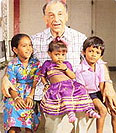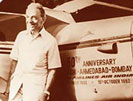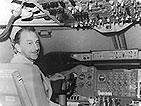The legend lives on
By T Damu | 30 Jul 2003
JRD Tata's personality traits still stand as exemplary characteristics that can never be emulated. T Damu remembers the gentleman industrialist in his birth centenary year Starting 29 July 2003, the entire House of Tata will celebrate the birth centenary year of the legendary hero of modern industrial revolution in India — the late Jehangir Ratanji Dadabhoy Tata. When the Tatas celebrate this occasion, the nation would remember one of her Bharat Ratnas that shines as a cynosure in the Indian industrial firmament.
Starting 29 July 2003, the entire House of Tata will celebrate the birth centenary year of the legendary hero of modern industrial revolution in India — the late Jehangir Ratanji Dadabhoy Tata. When the Tatas celebrate this occasion, the nation would remember one of her Bharat Ratnas that shines as a cynosure in the Indian industrial firmament.
JRD Tata was born on 29 July 1904.
My first meeting with JRD happened on a fine day, when I was working as a trainee in the Tata Trust at Bombay House in the sixties. One day, the train that I used to catch in the morning was delayed, and so I was late to the office.
I hurried along the silent corridor of the Bombay House and waited for the east entrance lift, which was normally used by JRD, the chairman of the group. While I was waiting for the lift, I heard firm, rhythmic footsteps behind me. I turned around. It was JRD. The moment I saw him, I gave up my plan to use the lift and took the nearby flight of steps.
As I covered six steps, the elevator door opened. And JRD clapped his hands to call my attention. He then gesticulated to me, not condescendingly, but with a gentle expression on his face, to join him in the lift. I got in with surprise writ large on my face. He then asked me where I wanted to go. When I told him that I was headed towards the second floor, he instructed the liftman to stop it at the second floor.
Before ejecting myself at the second floor, I thanked him once again and he, with an acknowledging smile and a nod, went up to his office in the fourth floor. That was the first time I met him. This accidental rendezvous and his genuine gesture of concern were an unforgettable experience for me.
Days to cherish
After my training, I joined the PR department in the Bombay House. The chief of that department was S A Sabavala, the PR advisor to the Tata group and the executive assistant to the chairman. Sabavala is one of the senior journalists of India, who was earlier the editor of The Free Press Journal and Asia chief correspondent for the Christian Science Monitor. It was a great experience working with him.
 Once JRD was invited to be the chief guest for a function at the National Institute of Training in Industrial Engineering (NITIE), Mumbai, by Air Chief Marshal P C Lal, who was the chairman of the governing body at NITIE. JRD was to deliver an extempore speech as his keynote address.
Once JRD was invited to be the chief guest for a function at the National Institute of Training in Industrial Engineering (NITIE), Mumbai, by Air Chief Marshal P C Lal, who was the chairman of the governing body at NITIE. JRD was to deliver an extempore speech as his keynote address.
Normally whenever the chairman or any Tata Sons' director was to attend a function, someone from the PR department will be deputed to cover it. This particular time, it was I who was on duty and I was told that since there will be no press people I had to prepare a report to be released to the newspapers later.
But when I entered the hall, I saw half a dozen journalists whom I knew personally. I wanted to tell JRD about it. But before I could meet him, he was off to the dais. And hence, I gave a chit, informing JRD about the presence of media persons in the hall, to Lal, which was to be handed over to JRD.
JRD started speaking, and to my surprise there were some highly critical comments about the economic policies of the central government. Then I knew that Lal might not have given my chit to JRD. Instantly, I felt that the dailies would feast on his remarks the following day.
Fire fighting
So, after the function I came to office and met Sabavala to inform about this unexpected event. Surprised as he was about the presence of journalists in the meeting, Sabavala asked me to wait in my office, until the chairman returned from the function.
After almost an hour, Sabavala, after meeting the chairman, called me to say that it was my duty to see to that no newspaper carried the highly critical remarks of the chairman the following day.
There were six major dailies. I pulled up my socks and got into action. I met my journalist friends who covered the function from those dailies and literally pleaded with them to delete the critical remarks made by JRD from their reports. It was one of the longest days in my early career solstice. I had a sleepless night.
The first thing in the following morning was to pick up the papers from the newsstand. Scanning through the reports, I was so much relieved to see that JRD's trenchant attack on the government policies the previous day were trimmed down by my friends to appear very natural and constructive in criticism. I took all the clippings and met Sabavala at his office. The good news was reported to JRD. Later Sabavala thanked me and said that the chairman appreciated my initiative.
Dealing with the media
Writing speeches for JRD was a tough job. He was a perfectionist to the core. The speechwriters of the Bombay House would stay very late flavouring his speech, which in his hands would thoroughly be redone. One could see his unique stamp of diction and delivery in each sentence. JRD never minced words. He was against phrases and slogans. He would clear his final draft speech at the last minute, and the PR department would then spring into action to release it to the media.
 JRD generally avoided interviews and media exposure. Once Venkat Narayanan, then editor of Onlooker and Free Press Journal (Sunday supplement), wanted to interview him and approached me to get an appointment. I took up his request with the chairman's office. But I was told that JRD had gently declined it. I conveyed this to Narayanan.
JRD generally avoided interviews and media exposure. Once Venkat Narayanan, then editor of Onlooker and Free Press Journal (Sunday supplement), wanted to interview him and approached me to get an appointment. I took up his request with the chairman's office. But I was told that JRD had gently declined it. I conveyed this to Narayanan.
That Sunday morning, however, I was surprised to see a front-page exclusive interview report with JRD. When I checked with the chairman's secretary, she said the clever Narayanan phoned up JRD that evening at his residence for a casual conversation. (Normally JRD used to pick up his residential telephone when it rings.) Then I knew it was that lengthy chat, which was converted into an exclusive interview.
The All India Radio (AIR) wanted to have an interview with JRD, who was also the chairman of the Family Planning Foundation of India, as a part of their feature on family planning programmes in India. JRD consented to give an interview. Mrs Bhatia of AIR, with all her entourage and equipment, entered JRD's office and started setting up mikes and other paraphernalia. This annoyed JRD, who said: "This is the whole problem with we Indians; we unnecessarily waste time on things like this."
The interview started and Mrs Bhatia shot her first question without addressing "Mr Tata" to which JRD politely suggested to her that she could begin the question addressing him as "Mr Tata." But Mrs Bhatia tried to explain to JRD that the questions will not be heard at the time of broadcast but only replies, in an edited format.
When JRD insisted on this formality, there was a slight argument over the issue. At that point I told Mrs Bhatia, why couldn't she do as JRD said. That infuriated JRD, who shouted at me to mind my own business. Finally, the programme was aired. JRD's interview was edited to sound as only statements from him as just a part of the whole feature on family planning. That was my last meeting with the chairman.
Tryst with destiny
As a student activist, I had a totally negative view of Indian industrial houses. But later, working with the Tatas, I found that they belonged to a different kind of industrialists with their philosophy of nation building through industrial revolution and constructive philanthropy.
In 1968, I interviewed JRD for Mathrubhoomi Weekly, a leading Malayalam publication, in which I had reported the enterprising industrial initiatives of the House of Tata and how good a corporate citizen the Tatas were. This surprised many former communist colleagues of mine and enraged some other hardcore elements, too.
When my interview saw print, I was on my annual leave at my native place, a village in the outskirts of Thallassery in north Kerala. That weekend I went to Thallassery town, blissfully unaware of the storm in the teacup of the extremists. I got down from the bus only to land in front of some Naxalite leaders. The legendary KPR Gopalan was among them. (KPR, a renowned Communist leader, during his Congress days as a freedom fighter was decreed to be hanged until death by British rulers, was saved from the gallows after Gandhiji's appeal to the British Raj.)
 As soon as he saw me, he caught me by my collar and scoffed at me: "When did you become the mouthpiece of capitalists, young man? Are you not ashamed?" The others too were jeering at me. I quietly took KPR aside and sat with him for half an hour explaining about the Tatas and the good work they were doing. He might not have been fully convinced by what I told him, but I could see a positive change in his eyes and facial expression.
As soon as he saw me, he caught me by my collar and scoffed at me: "When did you become the mouthpiece of capitalists, young man? Are you not ashamed?" The others too were jeering at me. I quietly took KPR aside and sat with him for half an hour explaining about the Tatas and the good work they were doing. He might not have been fully convinced by what I told him, but I could see a positive change in his eyes and facial expression.
A nonpareil gentleman
My career in the Bombay House came to an end. After a short break, I joined the Tatas again; this time at Tata Tea in Kochi. After this, I never had the opportunity to meet JRD, with whom my first encounter was a total surprise and the final was a sting.
Nevertheless each one had a lesson embedded in it. There were innumerable incidents and anecdotes quoted by many writers from the life of JRD that reflect the great personality of this late Captain of Independent India Inc.
Years back, during his visit to the Lockheed aircraft factory in the US, JRD, feeling thirsty, saw two water dispensers — one for the blacks and the other for the whites. He straight went to the one for the blacks. The officials of the factory tried to lead him to the whites' side. But he declined and drank water from the black's side stating that he too was a non-white.
This act prompted the authorities of Lockheed to discontinue the practice of providing separate water facilities for blacks and whites in their premises. Such personality traits of JRD stand even today as exemplary characteristics to be emulated by the entrepreneurs and industrialists alike.


















